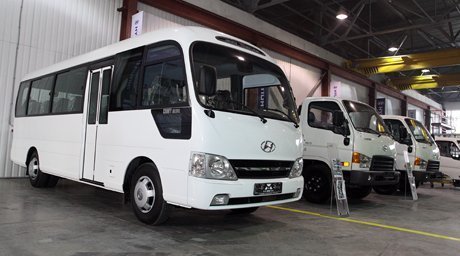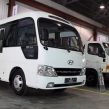
Kazakhstani-Korean Economic Partnership Strives Ahead
Publication: Eurasia Daily Monitor Volume: 10 Issue: 54
By:

Kazakhstan has become South Korea’s (also known as the Republic of Korea—ROK) main economic partner in Central Asia, and powerful complementarities exist between Astana’s desire for foreign capital and technologies, especially in order to develop its infrastructure and new high-technology sectors, and Seoul’s need for natural resources, particularly energy and other commodities.
Despite Kazakhstan’s landlocked status, its annual bilateral trade with South Korea now exceeds one billion dollars. Kazakhstan buys almost three times more ROK goods in terms of value than it sells to South Korea. The main reason is that Kazakhstan exports mainly raw materials while importing higher-value final products or parts of them, such as automobiles, electronics, televisions, petrochemicals and heavy equipment. The imbalance should decline over time as Kazakhstan increases its own non-raw material exports and as ROK companies move their assembly and production facilities within Kazakhstan. Additionally, the expansion of South Korea’s civilian nuclear power industry should see the ROK’s purchases of uranium from Kazakhstan increase. South Korea already obtains more than 30 percent of its uranium from Kazakhstan, which is the world’s largest exporter (Korea International Trade Association statistics, kita.org).
South Korea’s direct investment in Kazakhstan during the past two decades has exceeded $4 billion (ITAR-TASS, March 27, 2012). The ROK was the third largest foreign investor before the 1997 Asian financial crisis, when most ROK investment went to the mining and energy sectors. Since 2006, more Korean investment has been going to the industrial, infrastructure and high-technology sectors. Around 1,000 joint ventures utilizing some ROK capital now exist in Kazakhstan (Trend, March 26, 2012). For example, the South Korean automobile companies Ssangyong and Hyundai have established assembly plants in Kazakhstan. The ROK’s national power company Korea Electric Power Corp (KEPCO) is helping to build power transmission lines and modernize power stations in Kazakhstan. In addition, South Korean construction companies such as Dongil Highvill, Hanjin, SungWon and Yurim are building commercial residential housing. The Kazakhstani government has used tax breaks and other incentives to attract ROK investment to its priority industrialization and infrastructure projects (Tengrinews, August 31, 2011).
Energy is a major area of bilateral economic cooperation. In 2004, a South Korean consortium led by the state-run Korean National Oil Corporation (KNOC) established an oil company (ADA Oil LLP) in Kazakhstan’s western province of Aktobe. In partnership with Kazakhstan’s main oil and gas company, KazMunaiGaz (KMG), a South Korean consortium that includes the SK Corporation, LG International, Samsung and Daesung Industrial (KNOC, “Operations,” https://www.knoc.co.kr/ENG/sub03/sub03_1_1_2.jsp) is developing the Zhambyl oilfield in the northern section of the Caspian Sea, which holds an estimated one billion barrels of crude oil (The Korea Herald, April 15, 2012). Most of the oil produced by South Korean firms in Kazakhstan is sold locally due to the high costs of shipping the crude to South Korea, but plans exist for direct shipping in an emergency, such as if some interruption occurs in the ROK’s oil imports from other sources (Korea Times, November 8, 2011). In September 2012, Kazakhstan’s state-owned Samruk-Energy and KEPCO signed a memorandum to cooperate in researching and developing civilian nuclear power (Tengrinews, September 18, 2012). ROK companies are also helping Kazakhstan build wind farms (BNews.kz, September 13, 2012).
During President Nursultan Nazarbayev’s visit to South Korea in April 2010 and President Lee Myung-bak’s visits to Kazakhstan in August 2011 and in September 2012, the two heads of state discussed initiatives to deepen cooperation in various sectors, including agriculture, energy, environment, finance, healthcare, natural resources, trade, transportation, welfare and information technologies. As a result of agreements signed during these visits, a consortium of Korean and Kazakhstani companies is constructing a $4 billion petrochemical complex and a coal-fired “green” thermal power plant in Balkhash in southeastern Kazakhstan (Trend, September 8, 2012). Moreover, Korea’s LG Chemical and Kazakhstan’s Petrochemical Industries established a joint venture to build and operate a petrochemical complex in Atyrau that will serve the wider regional market as well as Kazakhstan’s domestic consumers. These massive projects, altogether worth $8–9 billion, have made the ROK a leading foreign investor in Kazakhstan’s state-run Program of Accelerated Industrial-Innovative Development (Tengrinews, March 29, 2012).
In addition to South Korean investment in Kazakhstan’s hydrocarbon resources, Astana wants the ROK to help Kazakhstan develop alternative and renewable energy sources as well as other “green” and high-technology sectors (Trend, March 26, 2012). The Kazakhstani National Innovation Fund joint stock company and the Korea Innovation Cluster Foundation have established a Korean-Kazakhstani Technology Cooperation Center (KKTCC) with offices in Astana and Daejeon. The Center aims to promote cooperation among Kazakhstani and South Korean companies and research institutions through joint research and development (R&D), training, and other projects (https://www.kttn.kz/en/content/korea-kazakhstan-technology-cooperation-center). The KKTCC’s Astana office, which opened in 2011, promotes the sharing of expertise and experience in agriculture, biotechnology, electronics, energy and information technology. The KKTCC is also establishing a research park at Nazarbayev University (Tengrinews, September 13, 2012).
The additional projects announced during the March 2012 Kazakhstani-Korean business forum in Seoul would, if realized, bring an additional $7 billion in ROK investment. They would include expansion of the Balkhash and gas-chemical plants as well as the increased local assembly of Korean automobiles, various energy projects, construction of more joint R&D centers, production of cross-linked polyethylene chemical foam, machine building, construction and several consultancy deals (Tengrinews, March 29, 2012). South Korea is also helping Kazakhstan develop high-speed trains and subways and expand its production of rare earth minerals.
In recent years, small- and middle-sized Korean companies have entered Kazakhstan’s market. They are supporting the implementation of the Kazakhstan-2030 social and economic development program and the Kazakhstan-2050 development strategy with their cutting-edge technologies (Interfax, February 8). The firms conduct local training, imparting skills to Kazakhstani workers, while promoting the export of their joint products to global markets. Meanwhile, major ROK companies are also entering Kazakhstan’s service sector. For example, South Korean banks are establishing branches in Kazakhstan, from which they hope to enter neighboring countries’ markets as well. The Joint Action Plan in healthcare for 2012–2015 also envisages growing cooperation between ROK and Kazakhstani medical service providers (BNews.kz, November 14, 2012). Thanks to their complementary economies, Kazakhstan and South Korea have been progressively expanding their economic cooperation, and this trend is certain to continue while Kazakhstan modernizes and develops further.




